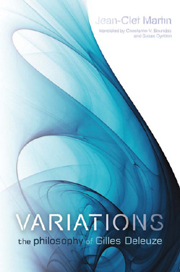Book contents
- Frontmatter
- Contents
- Letter-Preface by Gilles Deleuze
- Preambles
- First Variation: Ethics and Aesthetics
- Second Variation: Three Poetic Formulas for Nomadic Distribution
- Third Variation: Multiplicities
- Fourth Variation: Malcolm Lowry, or, the Manifesto of Things
- Postscript to the Anglo-American Edition: What is a Multiplicity?
- Notes
- Bibliography
- Index
Preambles
Published online by Cambridge University Press: 12 September 2012
- Frontmatter
- Contents
- Letter-Preface by Gilles Deleuze
- Preambles
- First Variation: Ethics and Aesthetics
- Second Variation: Three Poetic Formulas for Nomadic Distribution
- Third Variation: Multiplicities
- Fourth Variation: Malcolm Lowry, or, the Manifesto of Things
- Postscript to the Anglo-American Edition: What is a Multiplicity?
- Notes
- Bibliography
- Index
Summary
Deleuze's philosophy does not easily lend itself to commentary or to the caricatured suggestion that, upon meeting Félix Guattari, his writing drastically changed. ‘Two-fold writing’ necessarily requires special attention to guide the work through the interstices of shared passions or to matters increasingly external to pure philosophy, as witnessed in the unusual confrontation between cinema and so many other desire machines. There will be, therefore, a question regarding marriages and nuptials between the adventures of the concept and the machinations of extraordinary stories in the vein of Kafka's Metamorphosis, Proust's Remembrance of Things Past and Melville's Bartleby – to mention only the most emblematic encounters.
Given these solicitations, Deleuze's philosophy will be placed in a state of perpetual bifurcation, and will inevitably be carried to regions far from homegrown disputes. Moreover, it will be punctuated by a passion for the concrete, always experienced as a multiplicity that succeeds in doubling up the concepts. Perhaps this is the reason behind Deleuze's late decision to carry the history of philosophy, in his book on Leibniz, along constructions of extra-philosophical thought, despite the fact that the invented concepts had already been liberated from the exigencies of the university and linked to life. His classical style, as he mentioned, lies in his desire to grasp the world bodily, and thereby, on behalf of philosophy, take hold of areas that are external to it and incapable of being completely subsumed under a doctrinal consideration.
- Type
- Chapter
- Information
- VariationsThe Philosophy of Gilles Deleuze, pp. ix - xiiPublisher: Edinburgh University PressPrint publication year: 2010



